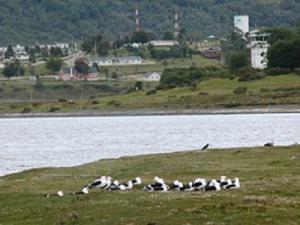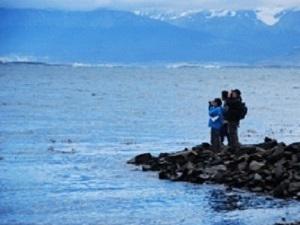Cristóbal Pizarro
Omora promotes the conservation of subantarctic avifauna through long-term research, education and ethical birding in Cape Horn Biosphere Reserve.

Gull colony and Puerto Williams town.
As the most diverse and abundant vertebrates in the Cape Horn Biosphere Reserve, coastal-marine birds are an important aspect of the biota of the sub Antarctic archipelago. This project will implement a long-term monitoring program to detect potential effects of global ecological change. These results will complement the Omora Ethnobotanical Park’s ongoing long-term socio-ecological research and outreach program. It will integrate results with the public and decision-makers via a course in the local school and develop ethical ecotourism-bird watching workshops for tourism operators.

In order to determine effects of development, tourism, invasive species, and other components of global ecological change, the project’s first priority is to establish a general baseline of information on shore and marine birds, which include; describe the inter-annual and intra-annual variation of shore and marine avian communities in the Cape Horn Biosphere Reserve; record ecologically-relevant natural history data on reproducing colonies of marine birds; synthesize and utilize information accumulated from multiple sources in a rigorous, unified database.
Additionally, the local-based education and ethical ecotourism program of this project will take place in the town of Puerto Williams, which has 2,200 inhabitants and is southernmost settlement in the world. Target groups will include:
i) the permanent Omora Natural History Course in the local school,
ii) the local Scout troop,
iii) the Puerto Williams tourism board.
These conservation efforts will be a “value-added” addition to another Omora Park project by adding new content to the implementation of a “Coastal Trail” at the Omora Park, which will include the observation of coastal microbiodiversity (such lichens, mosses, algae and intertidal macroinvertebrates) and also the marine-terrestrial gradient of birds. This trail will also be used for the “ethical birding” workshops with local tourism operators. In this way, the broader impact of the outreach component will include tourism operators throughout the region in Magallanes and also tourists, visitors and volunteers who access the trail.